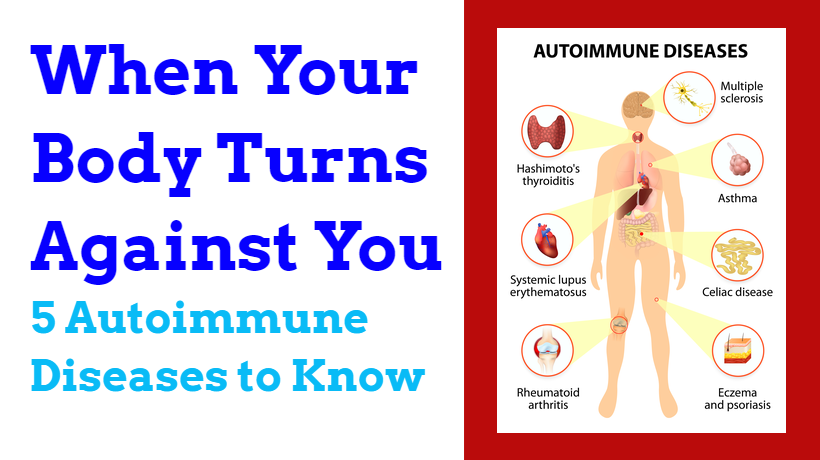Your immune system is your body’s most critical defense mechanism. It is the essential network of tissues, organs and cells which shields your body from intruders, protecting you from disease and infection. But, what happens when there’s a kink in your armor? According to the U.S. National Library of Medicine, an autoimmune disease occurs when your immune system begins malfunctioning, attacking the healthy cells in your body and mistaking the good guys for the invaders.
No one is exactly sure what causes autoimmune diseases, but we do know that they tend to affect women more than men. It’s imperative to catch these diseases early in their progression. While there are over 80 various kinds of autoimmune diseases, here’s a list of five common cases, and what to look out for in each.
Rheumatoid arthritis
Rheumatoid arthritis (RA) is one of the most common of the autoimmune diseases, affecting roughly 1.5 million people in the United States alone – and, according to the Arthritis Foundation, nearly three times more women than men. RA causes the immune system to attack tissue, causing painful inflammation and stiffness in the joints. If you’ve been experiencing unusual joint pain, tenderness or stiffness, or experiencing fatigue, loss of appetite and a low-grade fever, you could be exhibiting symptoms of rheumatoid arthritis.
Lupus
The symptoms of Systemic lupus erythematosis —the most common form of lupus—often appear similar to those of rheumatoid arthritis, making a correct diagnosis tricky. It can affect many parts of the body and range from mild to severe cases. However, some common signs include pain or swelling in joints, butterfly-shaped red rashes on the face, skin lesions, shortness of breath, chest pain, dry eyes, and fatigue. Although there is no cure for lupus, modern-day treatment can significantly help manage symptoms. It is also not uncommon for lupus to occur alongside Sjogren’s syndrome, an autoimmune disease that causes dry eyes and mouth.
Celiac disease
Celiac disease is one of the rare autoimmune diseases with a recognized trigger: gluten. When individuals with celiac disease consume gluten – found in wheat, rye and barley – the immune system responds by attacking the small intestine. Fatigue, amnesia and missed menstrual periods are all indicators of possible celiac disease in adults. Luckily, the condition has a simple fix: a gluten-free diet.
Psoriasis
While there are several different kinds of psoriasis, the most common is plaque psoriasis, and is indicated by red patches on the skin covered by silvery scales. If you find yourself with inflamed patches, particularly around the elbows, knees, scalp and lower back, you might be exhibiting signs of psoriasis and should see a doctor for treatment.
Multiple Sclerosis (MS)
Multiple sclerosis is a condition that affects the nervous system, attacking nerve fibers and the protective coating around the nerves of the central nervous system. This damage disrupts the communication between the brain and the body, resulting in the common symptoms of MS: muscle weakness, trouble with coordination, numb and/or prickling sensations in the body and visual disturbances. While MS has no cure, breakthrough treatments have allowed individuals with MS to live longer than ever before. If you experience any of these symptoms, be sure to get checked right away.
Sources:
https://www.arthritis.org/about-arthritis/types/rheumatoid-arthritis/symptoms.php
https://www.mayoclinic.org/diseases-conditions/rheumatoid-arthritis/symptoms-causes/syc-20353648
https://www.mayoclinic.org/diseases-conditions/multiple-sclerosis/symptoms-causes/syc-20350269
https://vsearch.nlm.nih.gov/vivisimo/cgi-bin/query-meta?v%3Aproject=medlineplus&v%3Asources=medlineplus-bundle&query=ms
https://medlineplus.gov/lupus.html
http://www.health.com/lupus/autoimmune-diseases#multiple-sclerosis-autoimmune
https://www.hopkinsmedicine.org/health/healthy-woman/conditions/what-are-common-symptoms-of-autoimmune-disease
https://www.medicalnewstoday.com/articles/311852.php



